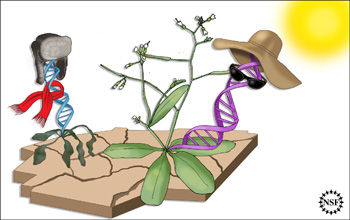News Release 11-216
Progress Towards Developing Plants That Accommodate Climate Change
The genetic basis of a plant's adaptability to climate is identified

Relatively few genes control whether these plants struggle or thrive in heat and other climates.
October 6, 2011
This material is available primarily for archival purposes. Telephone numbers or other contact information may be out of date; please see current contact information at media contacts.
The ability to promote agricultural and conservation successes in the face of rapid environmental change will partly hinge on scientists' understanding of how plants adapt to local climate.
To improve scientists' understanding of this phenomenon, a study in the Oct. 7, 2011 issue of Science helps define the genetic bases of plant adaptations to local climate. The National Science Foundation partly funded the study, which was conducted by Alexandre Fournier-Level of Brown University and colleagues.
The study involved growing a diverse panel of strains of the mustard plant, Arabidopsis, in various locations within its native range in Finland, Germany, England and Spain. Then, the genetic mutations increasing plant fitness in each of these locations were identified.
Results show that the preferred climate of each strain of Arabidopsis is conferred by the presence of a relatively small number of genes; different sets of genes control adaptability to different types of climates; and the presence of a particular set of climate genes in a single plant is not necessarily mutually exclusive to the presence of another. These findings mean that it may be possible to combine various sets of climate genes in a single Arabidopsis strain in order to generate a strain that would be able to thrive in multiple types of climates. Such adaptability would help the plant accommodate climate change.
-NSF-
-
The researchers' work is described in the October 7, 2011 issue of the journal Science.
Credit and Larger Version
Media Contacts
Lily Whiteman, lwhitema@nsf.gov, (703) 292-8310, email: lwhitema@nsf.gov
Richard Lewis, Brown University, (401) 863-3766, email: Richard_Lewis@brown.edu
Principal Investigators
Johanna Schmitt, Brown University, (401) 863-2425, email: Johanna_Schmitt@brown.edu
The U.S. National Science Foundation propels the nation forward by advancing fundamental research in all fields of science and engineering. NSF supports research and people by providing facilities, instruments and funding to support their ingenuity and sustain the U.S. as a global leader in research and innovation. With a fiscal year 2023 budget of $9.5 billion, NSF funds reach all 50 states through grants to nearly 2,000 colleges, universities and institutions. Each year, NSF receives more than 40,000 competitive proposals and makes about 11,000 new awards. Those awards include support for cooperative research with industry, Arctic and Antarctic research and operations, and U.S. participation in international scientific efforts.
Connect with us online
NSF website: nsf.gov
NSF News: nsf.gov/news
For News Media: nsf.gov/news/newsroom
Statistics: nsf.gov/statistics/
Awards database: nsf.gov/awardsearch/
Follow us on social
Twitter: twitter.com/NSF
Facebook: facebook.com/US.NSF
Instagram: instagram.com/nsfgov



